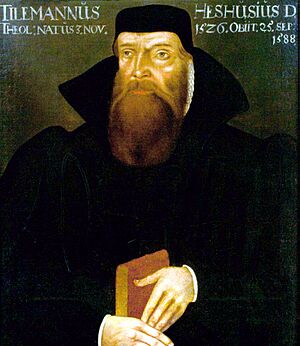Tilemann Heshusius facts for kids
Quick facts for kids
Tilemann Heshusius
|
|
|---|---|
 |
|
| Born | 3 November 1527 |
| Died | 25 September 1588 (aged 60) Helmstedt
|
| Nationality | German |
| Occupation | Theologian |
Tilemann Heshusius (born November 3, 1527, in Wesel – died September 25, 1588, in Helmstedt) was an important German theologian and a leader in the Protestant Reformation. He was known for his strong beliefs within the Lutheran church. A theologian is someone who studies religion and God. A reformer is someone who works to change things for the better.
Contents
Early Life and Education
Tilemann Heshusius came from a well-known family in Wesel. He studied at the University of Wittenberg, where he was a student of Philipp Melanchthon. Melanchthon was a very important figure in the Reformation. Heshusius was close to his teacher and learned a lot from him.
During a time called the Augsburg Interim, Heshusius lived in Oxford, England, and Paris, France. In 1550, he earned his master's degree. He then began teaching at the university, giving lectures on both public speaking and religious studies.
A Life of Debates and Moves
Starting as a Church Leader
In 1553, Heshusius became a church leader, called a Superintendent, in Goslar. He also earned his doctoral degree in Wittenberg that same year. However, he soon had disagreements with the people in Goslar. Because of these problems, he left in 1556 to take a new job at the University of Rostock.
Conflicts in Rostock and Heidelberg
In Rostock, Heshusius quickly found himself in more arguments. He disagreed with some practices, like Sunday weddings. He also had issues with Protestants taking part in Roman Catholic celebrations. He even tried to remove two important city officials from the church. This led to him being forced to leave Rostock.
After leaving Rostock, Melanchthon helped him get a new position. He became the main church leader for the Electorate of the Palatinate in Heidelberg. But in 1559, another big argument started in Heidelberg. This time, it was about the Lord's Supper, a special church meal. Heshusius argued with his assistant, Wilhelm Klebitz. To bring peace, the local ruler, Elector Frederick, removed both of them from their jobs. Melanchthon agreed with this decision.
Moving to Magdeburg and Forced Departure
Heshusius then moved to Bremen, where he got into another argument about the Lord's Supper. This dispute did not go well for him. He eventually resigned and moved to Magdeburg. In Magdeburg, he became a pastor at the Church of St. John in 1560. The next year, he became the Superintendent there.
However, Heshusius continued to speak out strongly against people he disagreed with. He even tried to ban the city council from the church. Despite being told to stop preaching, he continued. One night, armed citizens entered his home and forced him and his pregnant wife out of the city. This happened on October 21, 1562.
Seeking Shelter and New Challenges
Even his hometown of Wesel would not let him return. Count Wolfgang of Pfalz-Zweibrücken offered him a place to stay. After Wolfgang passed away, Heshusius went to Jena. There, he argued that obedience to the church was a very important sign of a true church. This was a different idea from what most Lutherans believed at the time. He disagreed with other important Lutheran leaders like Jacob Andreae and Matthias Flacius.
Later Years and Legacy
In 1573, a new ruler, Elector August of Saxony, took control of Saxe-Weimar. Many pastors, nearly 100, were forced to leave the area. Heshusius and Johann Wigand went to Königsberg in East Prussia. Heshusius became the Bishop of Samland in 1573. But when Wigand turned against him, he lost his position.
Martin Chemnitz, another important theologian, helped Heshusius get a good job. He became a professor of theology at the new University of Helmstedt. In 1578, his disagreements with Wigand were finally settled in his favor at a meeting called the Herzberger Konvent.
Heshusius had previously disagreed with efforts to unite different Lutheran groups. However, he was eventually convinced to sign an important document called the Formula of Concord. This document aimed to bring unity to the Lutheran church. But when he compared the printed version to the original, he found many differences. He was not happy with the explanations given by Chemnitz. The local ruler, Julius, Duke of Brunswick-Wolfenbüttel, also opposed the Formula. Because of this, it was not accepted in his country, which made it less powerful overall.
Tilemann Heshusius had two sons, Gottfried Heshusius (1554-1625) and Heinrich Heshusius (1556-1597). Both of them followed in their father's footsteps. They became Lutheran pastors and church leaders in Germany. They also supported the same strong Lutheran beliefs as their father.
Translations of His Works
- Raising Wings Like the Eagles: Overview of Isaiah 40 and Commentary on Isaiah 40:30-31 (2016).
- An Arduous Business: Overview of 1 Timothy (2016).
 | Jessica Watkins |
 | Robert Henry Lawrence Jr. |
 | Mae Jemison |
 | Sian Proctor |
 | Guion Bluford |

